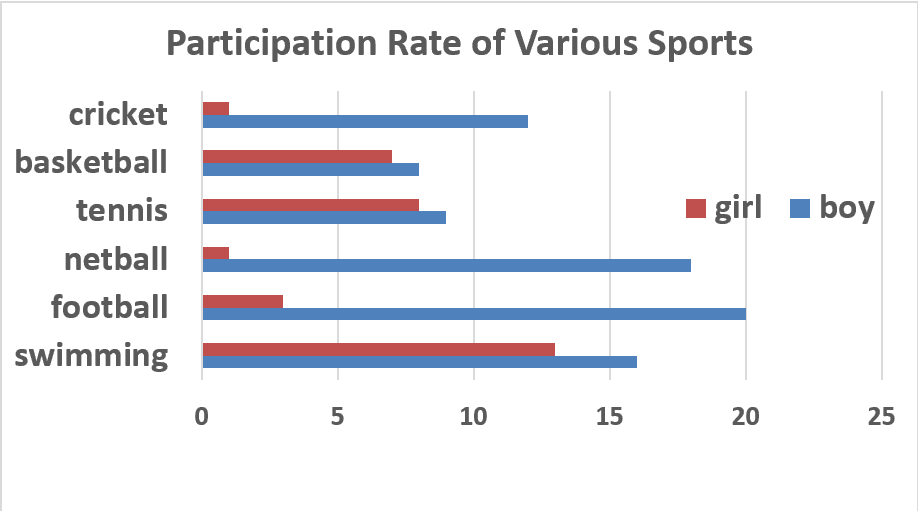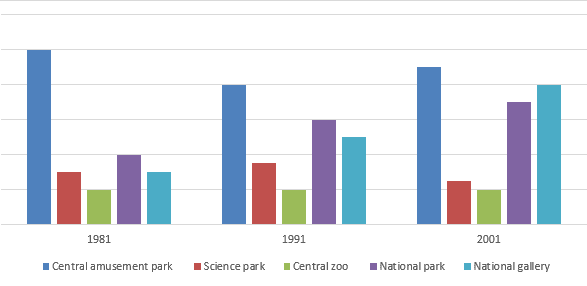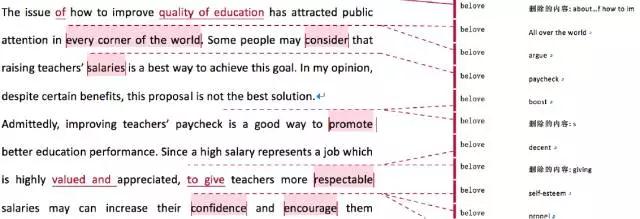刚开始接触雅思图表作文,考生们还是需要一些模板来参考的,不过那么多模板,今天小编给大家带来了雅思图表作文模版参考,希望能够帮助到大家,一起来学习吧。
雅思图表作文模版参考
首先考生要知道雅思图表作文的具体写作格式,雅思图表小作文的结构一般来说由三部分组成:开头引入,中间数据分析,结尾总结。考生们在拿到一篇图表作文模板时,可以根据以下几项来查看模板是否符合高分条件。
开头段改写:通常的方法是将题干中的信息进行改写,照抄原句不得分。改写方法主要有两点:动词的替换和句型的替换。
如果图表作文题目中的动词是show,那么在写作中就不要再用show了,可以用以下句型来替换:
The chart/graph/diagram/statistics/data/…
illustrates/depicts/demonstrates that …
The chart provides/presents/gives information about…
This is a graph which describes/illustrates…
This is a bar chart showing…
关键信息改写:这一步改写就比较灵活了,可以使用各种方法来实现,例如同义词替换,词性替换,句式改变,多种信息糅合在一起等等。
举例:The table below shows the proportion of different categories of families living in poverty in Australia in 1999.(剑雅4T1图表题)
从题干中得知,这题是关于澳大利亚贫困中的不同类别的家庭的,关键词组是proportion of different categories of families living in poverty。那么怎么来对这个词组进行改写呢?
首先可以做的是同义词替换。题目中的categories可以换成types。
其次,题目中直接是用的living in poverty,那么可以将这个补充成一个完整的从句。
因此,第一段就可以这样写:The chart describes 6 different types of families who were
living in poverty in Australia in 1999.
雅思图表作文主体段
图表作文的主体段会涉及到时间表达,数据分析,趋势分析这三个方面,这三方面的句型表达方式如下
句型一时间表达
between...and.../from…to… 从…到…
throughout… 在…期间
at the beginning of… 在…开始的时候
by the end/middle of… 在中期/某一段时间之前
from then on/from… onwards 从…开始
for at least… 至少…
in the following… 在之后多少时间
句型二数据分析
represent/ account for/make up/ constitute/comprise 占比
above/over/more than 多于
less than/below 少于
nearly 近乎
overtake 超过
…times more than…/twofold, threefold/twice, double, triple 倍数
range…from… 在…到…范围之内
in contrast 相反
句型三:趋势分析
上升:increase/rise/grow from…to…/ soar/shoot up
show/start/see a upward trend
下降:decrease/drop/ decline from…to…/ shrink
show/start a downward trend
drop by/to…
平稳:bottom out/ reach the bottom 最低点
reach a plateau/level off/level out 到达一个平稳点
remain steady/high 保持稳定/高
波动:fluctuate around…
程度大:dramatically/sharp/rapid/radically/considerably/remarkably/significantly/
noticeably…
程度小:slightly/gentlely/moderately/modestly
雅思图表作文结论段:一般来说一两句话即可。图表作文的结尾就是对主体段的数据分析进行一个总结,需要大家注意的是不要重复主体段的内容。同学们可以用以下词组进行总结概括:
In conclusion,…
Overall…
To summarize,…
It indicates that…
雅思写作Task2社会类考官范文
Every day traffic seems to get worse on our roads. How can we reduce the number of cars on our roads today? What alternatives can we offer car drivers?
Model Answer:
The more people that there are in the world, the more cars there are on the road. People are richer too and often families have more than one car. It has been proved that building more roads does not work; it just encourages more traffic.
So, what can we do? People like their cars and the freedom and independence that cars give them. One possibility would be to raise car taxes and fuel taxes so that people do not want to spend the extra money. Taxes on new car sales as well could be increased in order to discourage people from buying. Perhaps a used car sales tax could be introduced too. In the same way motorways could have tolls charged for using them although this may just increase congestion on smaller roads as people try and avoid the motorways. The government that introduces such ideas will not be popular though and would probably lose power. Governments would therefore be unlikely to set up such new measures.
I think it would be better to try and change people‛s attitudes and offer them alternatives. Educate them more about the pollution and waste that they are causing. Persuade them to car share, use public transport or even cycle if the distances are not too long. Countries such as Holland and Denmark are well known for how their citizens are passionate about green issues and how they use bicycles when they can.
Reducing traffic is a difficult task. I don‛t think it is possible realistically to reduce car numbers but I do think that we can change people‛s attitudes and get them to use different ways of travelling.
雅思写作Task2社会类考官范文
The wealth gap between 1st world countries and 3rd world countries seems to be increasing. How can we reduce this gap? Do you think that developed countries have a duty to assist developing countries in every way?
Model Answer:
Every day the rich countries in the world get richer and the poor countries get poorer. Can we reduce this gap? Of course we can. The question is whether the people in power want to do it?
Reducing the wealth gap can be achieved by cancelling third world debt, cancelling trade and farming subsidies so that third world countries can compete, getting rid of third world corruption and investing and building in third world countries using local people and skills and allowing them ownership of businesses. There are other things as well. Unfortunately there is no profit in business for first world countries to do these things. Some will do them but most will not. The ordinary man on the street wants things to be better for poorer countries and the politicians say that they will help but the politicians will in the end do what business tells them to do. Politicians also rightly feel they have a duty to protect their own countries and keeping economically dominant is part of this duty. Creating effective competition for their own country‛s businesses is not part of what they are expected to do.
This then leads on to whether I believe that developed countries have a duty to help the developing countries. Yes, I do. As an individual I believe that we have a duty to assist the poorer countries with their development in all aspects. We can provide teachers and education and doctors on the small scale and on the larger scale the things that I have talked about in the previous paragraph. Can we do this? Yes. Will we do this? See the previous paragraph again.
In conclusion you can see that I believe that there is a split between what would happen in a perfect world and what actually happens. We have a duty to reduce the wealth gap between developed and developing countries and we can do it, but it is unlikely that this will happen quickly.
雅思相关文章:
★ 雅思考试
★ 2020年雅思口语题库汇总新题
★ 雅思自我介绍高分范文
★ 学习资料库
★ 雅思8分英文自我介绍精选5篇
★ 8.22雅思考试真题回忆及答案参考
★ 博士申请奖学金的申请书范文
★ 有关博士国家奖学金申请书范文
★ 博士研究生国家奖学金申请书范文
★ 学习资料库
上一篇:雅思写作提分5点要求
下一篇:雅思写作冲刺高分注意事项




